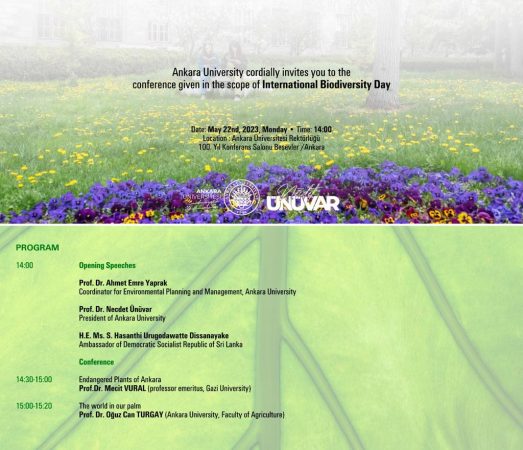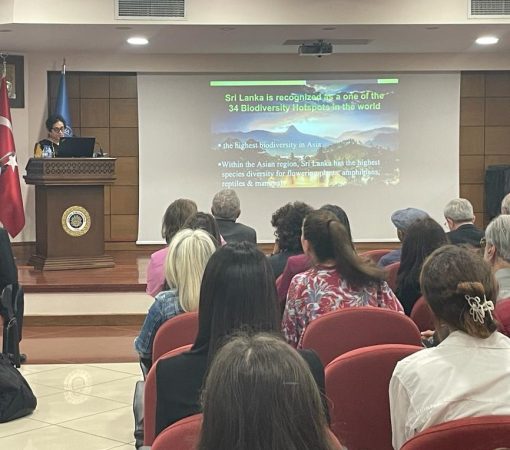
Ankara University organized a Conference to commemorate the International Biodiversity Day on 22 May 2023 at the University of Ankara. Ambassador of Sri Lanka to Türkiye, Hasanthi Urugodawatte Dissanayake was invited as a keynote speaker at the event.
The Ankara University, established in 1946, with its 19 faculties, is one of the oldest universities in Türkiye to establish a faculty of Agriculture in 1948, absorbing the Higher Institute of Agriculture.
The Ambassador was warmly welcomed by the Rector of Ankara University, Prof. Dr. Necdet Ünüvar, and Coordinator for Environmental Planning and Management of Ankara University, Prof. Dr. Ahmet Emre Yaprak. Ambassador and the Rector exchanged views on developing bilateral relations between Sri Lanka and Türkiye and possible mutual cooperation between University of Ankara and Sri Lankan universities by connecting professionals, experts, staff and students in the field of biodiversity and agriculture. Ambassador also congratulated Türkiye for undertaking to host the 16th Conference of Parties of the UN Convention on Biological Diversity in 2024. A copy of a publication on “Biodiversity of Ankara University” was gifted to the Ambassador.
The Ambassador made a presentation at the Conference under the theme of “Sri Lanka’s Biodiversity: its contribution to humanity”. Addressing the gathering, Ambassador highlighted the Sri Lanka’s unique ecosystems and high biodiversity with statistics and images of the highest species diversity for flowering plants, amphibians, reptiles and mammals in Sri Lanka. She also described about the factors that have threaten biodiversity in Sri Lanka, current status of conservation together with national policies and strategic plans in place. She also described the relevant government agencies engaged in conservation and protection with inter-agency coordination mechanisms and how those agencies collaborate with the academia and experts, role of private sector and NGOs. Role played by the Blue Carbon Ecosystems with Sri Lanka’s mangroves, seagrass beds, salt marshes in carbon sequestration was highlighted as a key factor in contributing positively to mitigate climate change impact.
She highlighted that Sri Lanka is the first country in the world to have a policy, guidelines and an action plan on mangrove conservation. Sri Lanka’s expertise and experiences are being widely shared globally, particularly through the Commonwealth Blue Charter, of which Sri Lanka leads the Action Group on Mangrove Ecosystems and Livelihoods. The important role of mangroves in controlling salinity intrusion was explained with an example of a rice cultivation, which needs fresh water, within about 20 feet away from the mangroves growing in the saline water filled Komari Lagoon in the Eastern Province in Sri Lanka.
The biodiversity of Sri Lanka also provides immense opportunities for food security and for research and development of new pharmaceutical products, in addition to its contribution to the country’s Ayurvedic healthcare traditions, with far reaching global benefits. Biodiversity is also intertwined with the tourism and fisheries sectors and supports local livelihoods. Ambassador Dissanayake further elaborated on the Sri Lankan culture with majority of people following religions promoting non-violence and to be compassionate, not only towards human beings but also towards the nature. These cultural traditions, over the centuries, contributed to understanding the value of the protection of nature and human coexistence with flora and fauna.
Ambassador Dissanayake also indicated the key initiatives and measures taken by Sri Lanka to protect and conserve its biodiversity such as establishing protected areas, wildlife conservation, species conservation, and forest conservation and marine conservation. Environmental education and awareness, is an aspect that the country has been focusing much. As a result, environment and climate change issues are now being included in the school curriculum in Sri Lanka as that is the only way to ensure that consciousness on the need to protect our environment, including the biodiversity is inculcated in the minds of people. Further, Sri Lanka is in the process of setting up world’s first ever university dedicated to climate change, with Sri Lanka’s President having announced it at the 27th Conference of Parties of the United Nations Conference on Climate Change held in held from 6 -20 November 2022 in Sharm El Sheikh, Egypt. The President acknowledged that although climate change is a significant challenge for the world, there is no central research hub to study it, and invited multiple countries to join Sri Lanka in the effort.
Among other speakers were Rector of Ankara University - Prof. Ünüvar, the Coordinator for Environmental Planning and Management of Ankara University - Prof. Yaprak, Emeritus Professor of Gazi University - Prof. Dr. Mecit Vural and Professor at the Agriculture Faculty of the Ankara University - Prof. Dr. Oğuz Can Turgay. Academics and researchers specialized in agriculture and environment, Ambassadors, representatives from diplomatic missions in Ankara, media personnel also participated in the Conference.
Embassy of Sri Lanka
Ankara
25 May 2023







